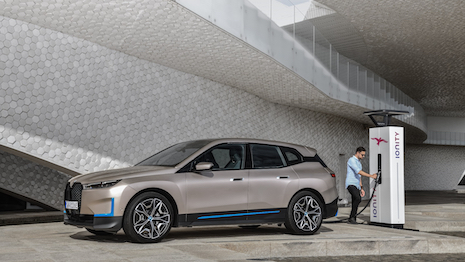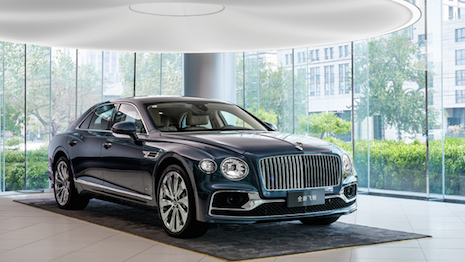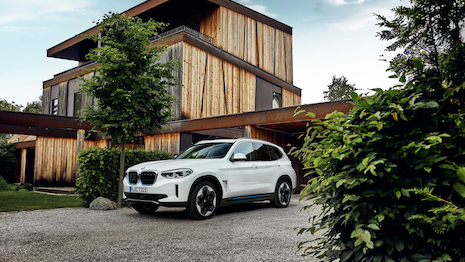 As more drivers invest in electric vehicles, charging infrastructure is improving. Image credit: BMW
As more drivers invest in electric vehicles, charging infrastructure is improving. Image credit: BMW
As the global automotive industry continues its recovery in 2021, digitalization and electric vehicles will continue to drive growth.
During a webinar on Jan. 28, speakers from researcher Frost & Sullivan identified key trends in the automotive industry, which is forecast to see strong sales this year. Automakers that rely on the market in China, including luxury marques, are well-positioned to continue benefitting into 2021.
“As we look into 2021, we expect Asia to have the least growth of 6 percent, whereas we expect Latin America to have the most growth about 40 percent,” said Sarwant Singh, managing partner at Frost & Sullivan, Dubai. “But what we have seen is that the luxury vehicle market has been very resilient, mainly thanks to China.”
COVID recovery continues
Frost & Sullivan expects the global automotive industry to grow by 8.1 percent, for estimated sales of 83 million light vehicle sales. As herd immunity builds, sales activity is expected to peak around the second and third quarters.
Countries are seeing their economies recover from the COVID-19 pandemic at different rates, which is impacting the automotive sector.
For instance, China’s economy managed to grow 2.3 percent in 2020 while Europe is facing more of a W-shaped recovery. This is part of the reason that automakers with a high dependency on China fared better than those with a higher reliance on European markets, according to Mr. Singh.
 Bentley Motors has 40 showrooms in China. Image courtesy of Bentley Motors
Bentley Motors has 40 showrooms in China. Image courtesy of Bentley Motors
Within the luxury vehicle segment, the Asian market saw 13 percent growth while Europe and North America saw respective declines of 21 and 18 percent. Overall, the segment posted a sales decline of more than 10 percent year-over-year.
Despite this shift, sales of premium and super premium vehicles were more resilient than mass market cars — accounting for 12.2 percent of all sales, up from 11.5 percent in 2019.
Among premium and super premium original equipment manufacturers, U.S. automaker Tesla saw double-digit growth of 32 percent on the strength of electric vehicle interest.
No other premium or super premium OEM in the top 10 of units sold saw sales growth.
Notable results include BMW Group with a sales decline of 11.6 percent and Tata Group, owner of Jaguar Land Rover, with a sales decrease of 23.8 percent.
While COVID-19 has not accelerated the adoption of electric vehicles in the U.S. (see story), the same cannot be said about EV sales elsewhere.
 BMW’s iX3 electric SUV is manufactured in China, and sold in Europe and China. Image credit: BMW
BMW’s iX3 electric SUV is manufactured in China, and sold in Europe and China. Image credit: BMW
Europe became the leading EV market, accounting for a 42.5 percent share of sales compared to China’s 41.6 percent. Governments in both markets have set targets for phasing out traditional combustion engines.
Charging infrastructure is also improving, increasing consumer confidence towards EVs. While Tesla is still the market leader, luxury automakers are set to introduce more plug-in hybrid EVs and battery EVs in the coming years.
“We anticipate the demand for electric use cars to increase by six times in Europe within the next five years,” said Dr. Julia E. Saini, associate partner at Frost & Sullivan, Dubai.
Digital push
According to Frost & Sullivan, consumers are expecting improved connectivity in their vehicles. This growing comfort in digitalization also applies to the car buying experience itself.
The researcher expects more than 3.5 million vehicles will be sold online worldwide in 2021.
However, consumers still have different approaches to digital car buying. As Dr. Saini explains, some drivers feel comfortable completing the purchasing process entirely online, while others may simply do online research or complete the transaction in-person at the dealership.
The introduction during the pandemic of a range of digital tactics, such as online showrooms, virtual test drives and contactless delivery by the likes of Jaguar Land Rover, Rolls-Royce, Mercedes-Benz and Audi, has set a new bar in the industry (see story).
Earlier this month, British automaker Bentley Motors introduced online offerings to digitize the car buying experience during the COVID-era. Through Bentley’s Digital Commissioning Experience, clients are now able to remotely personalize their vehicles with the help of the automaker’s retailer experts (see story).
“There is no turning back at this point,” Dr. Saini said.